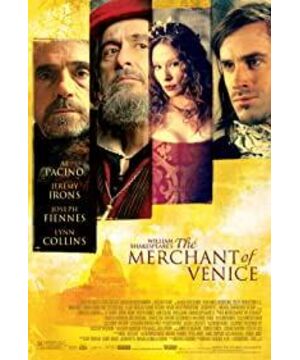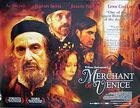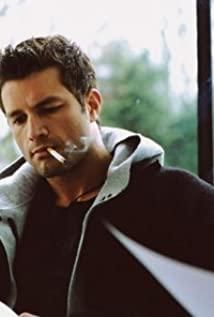one day last week, thinking about having not watched a movie for a long time, he went to search for a movie. The income of "The Merchant of Venice" is probably not a very new movie.
It seems to be a new movie. I will try to find Shakespeare’s adaptations. The biggest complaint at the moment is that "Anything Nothing" is still not available, and this is my favorite comedy; the post-modern version of "Romeo and Juliet" has always been disliked, while French music The drama version of "Romeo and Juliet" has been put in my MP3 for four months and has not been replaced. As for "TITUS", Zhu Shenghao's translation of "Titus Andronicus" is a complete surprise: I recognized Anthony Hopkins as the expressionless old man whose face was smeared with mud on the cover, so I bought it without hesitation. This is a small-cost production, completely dramatic and not like a movie. The style is a mixture of classical and postmodernism-the Roman emperor in the white uniform of Phnom Penh and Lavinia, who had her tongue cut off after being raped and tied to a tree, seemed to be postmodern, while the composition of the lines and the style of TITUS herself It’s classical. That film made me uncomfortable to watch-I think this is the director's intention, because the atmosphere and tone of the whole film are distorted and unstable-and I fully understand Hopkins As a veteran Shakespearean actor, Old Man Si has amazing control over expressions and emotions. So when I bought "The Merchant of Venice" this time, he felt that as long as he reached the level of "TITUS", it was worth it.
I came into contact with Shakespeare because when I was 13 years old, my grandma gave me a 12-volume version of "The Complete Works of Shakespeare" by Zhu Shenghao from the 1978 edition. In the summer of my second year, I sat on the floor for a whole summer vacation. After reading this book, I searched for God. Remember, Agatha Christie and Les Misérables that can be borrowed in the library of my dad’s work, etc. That summer I broke the cover of the second book of Shakespeare's play, and then hurriedly packed the entire book. Book cover. At the age of 13, my favorite comedy is "Nothing Makes Nothing", and my favorite tragedy is "Macbeth". This evaluation will remain the same after more than ten years. But it is also like the translator of "Blade", Mr. Zhou Xuliang in the preface. What it said:
Sometimes, due to poor literary accomplishment, one cannot appreciate the characters created by the writer. This is the case. When I was a student, I couldn’t appreciate the image of Shakespeare’s King Rie. Later, I read AC Bradley’s "The Tragedy of Shakespeare" only found out that his literary accomplishment was insufficient.
——The originally hated "King Lear" and "Hamlet", I finally felt the weight inside when I arrived at university, and at the same time gradually abandoned "The Tempest" that I loved since I was a child. But not all screenplay perceptions will change. For example, "The Merchant of Venice", I didn't like it since I was a child, and I still don't like it even now. The third book of Shakespeare's play at home is almost as flat as new in contrast to the old book with the cover turned over and the edges of the book turned over.
It’s strange that what you don’t like may not be what you will forget. Over the years, I have forgotten many things. I can’t even remember the main plots of those historical dramas, but I clearly remember the plot in "The Merchant of Venice" where Sherlock said that Antonio had spit on his Jewish robe. I remember Portia’s final line in defense of Antonio.
The self-consciousness is not a comedy. Chatting with friends before watching it, she also said:
In our opinion, this can only be a tragedy.
At the beginning of this film, there were three things that made me satisfied.
The first is music. It is rare to see such clean music and vocals. The tune is slightly sad, and it was clear from the beginning that this is not a comedy.
The second is clothing and background. The carnival-style gorgeous costume is one of the highlights, but it is not a place to impress people. And seeing the heavy, worn-out Jewish robe of old Sherlock when he appeared on the scene, and seeing the mixed scene of humans and animals in the Jewish living quarter, I began to have confidence in the background investigation of this film.
At the end, is the beginning of the description.
It’s like I’ve never been used to writing French works from the 16th to the 18th centuries, rendering the luxurious and romantic life of the French aristocracy to the utmost, but never mentioning the dung water and epidemics on the streets at that time; I’ve seen it. Many works, so many years of pen nibs, have written all about the Jews' stinginess and only money, but they rarely mention the persecution they have suffered. Of course, Jews are not tolerant. The Jewish holy scriptures clearly describe their isolation and stubbornness to their national traditions. But from the Old Testament to Roman history to the accidental triptych of Jewish culture books, buried in the lines are the inhuman treatment they have suffered for thousands of years. No wonder their intolerance and self-enclosure, nor theirs. Javier must be reported.
These are of course digressions. But the director's open-minded and clear statement of his position is not uncomfortable. Although there are so many years of class struggle education, even though the teachers blindly taught Sherlock = cruel and stingy when studying, even children can detect that these evaluations conceal the most important things. What's more, Shakespeare was never an honest man at all. His age was the age of the supremacy of Christianity (the Anglican religion in the UK), and the age of hostility and oppression of the Jews. Against this background, he wrote in the mouth of the Jews, "...You have taught me cruel methods, and I will definitely follow your teachings, and I will do more respectful" lines, which is enough to see this. What kind of heart is in a person's bones?
My friend told me that when she watched this film, she only noticed Al Pacino and Jeremy Irons, two old handsome guys. The other young characters didn't pay attention to it. Laugh, my old handsome nympho took it a step further, even Jeremy Irons didn't pay attention to it, I just saw Al Pacino, an old drama.
Looking at the script of "The Merchant of Venice", the love between Bassanio and Portia is undoubtedly one of the highlights; but in the movie, the plot is more like an introduction and background. As Bassanio himself confessed, "My noble family background is my only property"-this boy, like everyone around him, is luxurious and frivolous. His only advantage may be that he is still honest—to Antonio Ken and confess to Portia; and he is still loyal—not to leave his life and death friends behind his head after marrying his beloved wife and family. Compared with Portia's suitors, he was a normal person, and nothing more. The director exaggerated his ostentatious side, especially in the scene where Lancelot's old father Gao Bo visited him. He and Graciano's face-to-face remarks to the old man and the expressions of the father and son after they turned around, really couldn't have a good impression of him.
My impression of this actor and this character is limited to this—perhaps the beautiful legs when I proposed to Portia, um.
Portia is a Portia who fits the script very well-except that it is not beautiful enough. The actor has a pair of flexible eyes and appears to be much smarter than Bassanio-in fact this character is indeed much smarter than Bassanio. She is independent and wealthy, but not particularly arrogant and arrogant, and she is humble and respectful to those she loves; she is witty, so she is able to take part in the final court debate; she is very scheming, knows how to tempt, and knows how to give to her husband Save face-no matter what era, this is a great virtue. And all of this makes me feel that Bassanio is not worthy of her, no matter when I am watching a script or watching a movie.
Portia in the movie behaves more like a queen, dominating her island. After she sent Bassanio away, she smiled and took the hand of the maid and walked back. It was a game I really liked. Most of the mistresses in Shakespeare's plays still speak ill of the maids, and Bonia is one of the few. Outside of the courtroom and her lines, she was calmer and more sympathetic than everyone else—of course, it had nothing to do with her premeditated plan, but it was better than seeing the jaw-dropping cheeks of Bassanio and Greciano.
But having said that, to jump away from this role, this lady’s acting skills are really stiff—especially when compared with those two old guys... the
old guy Antonio fits the impression of the script very, very well, and this should be attributed to it. Is it the acting or the temperament of the actor? As imagined, he was an older, unassuming, clean and gloomy person. And because the actors read the lines slowly and lightly, they seem to be more and more melancholy. Shakespeare wrote his lines, with gorgeous metaphors bouncing out one after another, making the originally relatively calm character appear clever. In the movie version, the gorgeous part of Antonio's lines was greatly deleted, leaving only the main body of meaning, making this character more and more like a shadow.
The only part where Antonio appeared to be more powerful was the one where he spoke to Sherlock, and his sense of presence gradually diminished afterwards. The court confrontation... The court confrontation was almost entirely Sherlock's one-man show, and Antonio had a pitiful look, which could be described as pitiful.
Then Sherlock...laughing & wry smile, Sherlock...
I rarely care about the actor, except for his performance in the movie. So even though I was told beforehand that the film was played by Al Pacino, I didn't realize who he was playing until the end of the credits were typed. In the whole film, Sherlock exists as Sherlock, completely born out of Shakespeare's lines, and truly bears the Jewish background, a living Sherlock. It was also at this time that I came over: Hey, Al Pacino’s acting skills are really tough...
Sherlock was spit on the bridge by Antonio, Sherlock was buying lamb in the market while listening to Bassanio’s request, and Sherlock was in his own The cabin said to Antonio, "You call me a heretic, a murderous dog, and spit on my Jewish robe, just because I used my own money to earn a few interest. Okay, it seems you are now asking me for help. When it's up, Sherlock is still interacting with other characters, and Sherlock in the scene. When Sherlock went to dinner with the Christians, the director separated him from the surrounding banquet scene. From then on, Sherlock was truly an independent Sherlock with bright colors. In the luxurious and corrupt Christian banquet, Sherlock was sitting on the sidelines with a wine glass; Sherlock, who was suddenly aging ten years old by grabbing her daughter's daughter when she returned home, was suddenly aging; Sherlock wandering bitterly; in the dark and ambiguous brothel, with her back arched, her eyes burning, her lines threw like sherlock with blood from between her teeth. Shylock said that Jews don’t have eyes, five senses, limbs and no sense of the line. Some people criticized the drama as being too heavy, but Shakespeare’s dramas were originally "successful with rhetoric, and use gorgeous rhetoric... Those smooth verses are enough. Instead of the plot, and I found that those long talks gradually reached the expected climax with extraordinary skills, as thrilling as any thrilling scenes in the movie." So even if the director doesn't need to be obsessed with prostitutes, the appeal of this scene has been fully demonstrated.
The dialogue between Sherlock and Duber originally played a role of confessing information in the plot, but this one became the one that impressed me the most except for the court debate. Even though I was watching the movie intently and knowing how the plot progressed, but when Duber said that Jessica exchanged a family ring for a monkey, Sherlock's "How dare she!" was still the same. I was so scared that I almost jumped up from the chair. In Zhu Shenghao’s translation, Sherlock just said, "Damn, damn! Dubell, it makes me sad when you mention this." Al Pacino's scream, which seemed like a wounded beast, pressed a heavy sense of pain. In the minds of the viewers.
In a court debate, Sherlock played very moving, and the most moving was when Antonio made the last condition. When I first read this script, I still didn't understand the history and opposition of Judaism and Christianity, so I didn't understand the story advancement at each level. I just felt that when the Duke declared that the property was confiscated, Sherlock still said, "Take my life together with the property. I don't want your forgiveness." When Antonio made the condition, he simply said "I am satisfied". , Probably what kind of mood is desperate. Later, my reading horizons slowly expanded, and I realized what kind of hatred, rejection, and superiority Christians had towards Jews at that time, and only then did they understand how deep the gap between different religious cultures is. The arsenic. For Jews, it is more unthinkable to give up religion than to give up property. Property is only the foundation of their lives, but religious culture constitutes the basis of their lives. Portia's retort made Sherlock look around blankly; further counterattack made Sherlock prepare to leave in a panic; when the Duke issued a sentence, Sherlock had the strength to refute that you might as well kill me; wait until Antonio weakly said that Sherlock would change When I believed in Christianity, I saw expressions falling from the old man's face layer by layer, and the person collapsed bit by bit, lying on the ground into a small ball. At that time, there was only resentment left in my heart, resenting what was the good thing about the good old Christian whom Antonio called him, and where was the tolerance of Christianity. But at the same time, it is also clear that this is the superiority that Christians have towards non-Christians, the tolerance they have for them, and the salvation they have for them.
That's why I saw the last scene: Jews poured into the church to worship, and only Sherlock, who could not even be worn by Kippah, stood in the middle of the square, watching the door slowly close in front of him. When I saw that scene, my tears couldn't stop falling, and people couldn't take it back until the end of the song. The original script ended where Portia revealed her identity and reconciled with Bassanio. It can barely be regarded as a "restoring atmosphere" ending, but the two scenes that the director performed outside of his lines are truly tragedies ( In my own heart, I think that Jessica will not matter whether or not it will be a big problem).
And how can this story be considered a comedy?
Sherlock,
who lost her daughter, lost property, deprived of her faith, and rejected by her compatriots; married to a loved one, but found that the other party could not even keep the oath, so she could only open one eye and close one eye. Portia; the
beginning is only a shadow single, and in the end, everyone else
returns, and he is still a single shadow Antonio; in the original drama, at the end flirting with the lover and flirting with the exit, in the movie, the regret is getting stronger with the ring. Jessica; if you
really want to say that whoever gets the happiness without shame, it is probably only the carefree couple of Glaciiano and Nelitha.
My view has always been: Although writers like to put up the "If there is any similarity, it is pure coincidence", the source of novels or scripts is indeed life itself. Those fragments can be found truthfully in life. The ability of the writer is to divide and extract the fragments from life according to a certain order, and then weave them, so that the uncontrolled and messy details we see in life are recombined with the logic predetermined by the writer, which forms the story. sex. So no matter how happy, how sad, how cruel, how desperate the work is, it is still life itself. It was the same five hundred years ago, and it will be the same five hundred years later.
Therefore, the so-called comedy is probably nothing more than a flower blooming in the mud. In and out of the play, there is still less laughter and more tears.
Btw 1: Good boy, don’t learn how I watched this film on non-weekend days, but I got up the next day and went to work with swollen eyeballs ==
Btw 2: Kippah is the kind of hat worn by Jews on the back of their heads. Traditional Jews (especially men) are not shaved except for sleeping. They wear Kippah to show their belief in the only god and their humility.
Btw 3: The two songs in the film are very moving, especially the kid who sang along when Bassanio chose the box. The sound is as clean as crystal. I have never heard of this voice, so, surrendered ^___^
Btw 4: Four years ago, I read a novel in the Middle East, and wrote about a brief encounter between a Jewish girl and an Arab girl, and then they moved with their own tribes. Wandering, but always caring about each other. I really don't remember the name of the book. Can anyone who has read it help provide clues?
View more about The Merchant of Venice reviews











